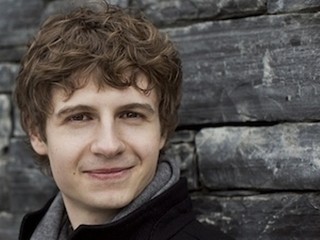|
Back
A Bright and Distant Star New York
Zankel Hall, Carnegie Hall
03/24/2015 -
Wolfgang Amadeus Mozart: Fantasia in C Minor, K. 475
Robert Schumann: Fantasie in C Major, Opus 17
Alexander Scriabin: Piano Sonata No. 4, Opus 30 – Vers la flamme, Opus 72
Ludwig van Beethoven: Piano Sonata No. 32 in C Minor, Opus 111
Pavel Kolesnikov (Pianist)

P. Kolesnikov (© Colin Way)
While I had never heard of Canada’s “Honens International Piano Competition”, I am sufficiently respectful of money (the prize here is $100,000 plus a big career boost) to think that it must be a very big deal. So before the recital by 23-year-old pianist Pavel Kolesniikov, a winner of this award two years ago, I was in awe of his talent.
The prelude to awe didn’t quite translate to reality. There was no doubt that the Siberian-born artist has the intellect and the fingers to bring authority to his extremely difficult program last night. But such authority was not necessarily the final note for unadorned success.
Mr. Kolesnikov has been living in London for many years, and has been esteemed in his adopted country, both in his teachers, his reviews and his present position as one of the BBC Radio Three “New Generation of Artists”. Yet one must ask whether a bloodless first half is due to his excess Anglicization.
Both C minor fantasias, by Mozart and Schumann, were characterized by sensitivity, intellect, and an appreciation of their musical genius. But neither of them were especially impressive in their emotional communication.
The Mozart C Minor Fantasy is historically tragic, since it gives some indication of where Mozart might have gone had he lived longer. His abrupt changes, his moods from violent to tender, were almost experimental for the so-called “classical” period. Mr. Kolesnikov gave due respect for these changes, he gave equal weight to every section, his articulation was clean, his octave run at the end faultless, and it was somewhat remote, almost cold.
Yet one rarely felt that Mozart was trying to express anything here except inspired compartmentalization. Mr. Kolesnikov was proper, well-prepared but reluctant to step out of the Classical mold. It was not a moving performance.
Nor was there any excuse to play the Schumann C Major Fantasie with such directness. No, not always direct. The first notes gave a hint of the tempest to follow, the tender right-hand melodies were lyrically right, Yet mainly in these opening movements, Mr. Kolesnikov demonstrated the Romantic temperament mainly by extended retards. Had they been suspensions or breaths, or Schumannesque questioning, that would have been fine. But they seemed as if Mr. Kolesnikov had decided to give himself an idiosyncrasy or two.
To his credit, that third-movement march was bristly enough, Langsam was played with such sensitivity and balance, such gorgeous colors that one thought for the first time that Mr. Kolesnikov really was a Russian pianist, that he wasn’t afraid to show unfettered Slavic emotion.
Still, I could not imagine at this point in his life that the pianist could offer an authentic Prokofiev or Shostakovich performance. His artistry is too nice, too civilized. But certainly in the two Scriabin pieces, his fine technique spoke for itself. Whatever violence Scriabin put into his music, it was never personally acerbic, but leavened with his mysteries of mysticism. And Mr. Kolesnikov obviously did Scriabin proud. The Vers la flamme, very late Scriabin, had a volition, an energy and the almost unbearable crescendo to a prestissimo climax, performed with a genuine sense of fever. The short earlier Fourth Sonata was equally powerful, ending in an equally prestissimo (with Scriabin’s direction to “make it fly”).
The single adjective to describe every work on the program would be “enigmatic” (though this should apply to all great music). And the Beethoven Opus 111 is certainly in this category. Mr. Kolesnikov didn’t add anything to the greatest performance of this work, nor will I remember it for being especially searching. But he essayed that first movement with tremendous assurance and sweep. And the second movement Adagio molto was performed with as much introspection and wonder as a 23-year-old can summon up.
His encore, though, was memorable for its sheer audacity. After so many difficult works, he played the first two movements of Schumann’s Children’s Pieces. It might have caught the enthusiastic audience by surprise, but I personally felt that it had exactly the right simplicity of expression to suit an obviously burgeoning, and still subdued star of the future.
Harry Rolnick
|